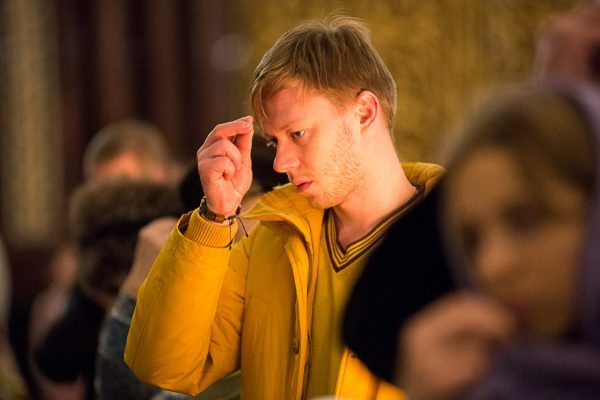Someone, apparently a young adult, wrote me recently and asked about prayer. This person was having a hard time discerning the difference between worry and prayer. He or she was wondering if prayer, although salutary to ourselves, really does have an effect on those we pray for. Particularly, this person was worried about and/or praying for his or her parents who seemed to be getting further and further apart. Did God hear his/her prayers for them? Do a child’s prayers really make any difference for the parents?
What I wrote to this person is not all that could be said on this matter, nor is it probably the best thing that could be said. It is, however, what I think; and I hope it was helpful to this young person. The problem of pain and suffering and apparently unanswered prayer is a great scandal to many, a theodicy, a reason for atheism. For others, the same pain and suffering and apparently unanswered prayer initiates a struggle with God that results in divine revelation, a Job-like encounter with God that reframes everything. This has been (and still is) my experience, and so it tends to colour how I see everything. And so please forgive me if my approach seems too heavy, a lighter touch may indeed be what is needed for many. But since much of my life has been rather heavy, what I have written seems to me to be about right .
Here is some of what I wrote:
There is a big difference between worry and prayer, although at the beginning they may feel very similar. In fact, what begins as worry can lead us into prayer. When we pray for someone or some situation we are worried about, we may begin by trying to tell God what we would like to happen, what we think can and should happen. But soon we realize that God already knows so much better than we do about what can and should happen. We also realize that God loves our loved ones much, much more than we do. God loves and is powerful, but people are free. People make choices—often not even realizing that they are doing so at the time—but people make choices nonetheless, and God respects those choices.
And so we pray that God have mercy, that God touch the hearts of our loved ones. God is the only one who has access there, the only one who can touch another person where it will really make a difference. But still, each one makes choices. Each of us must humble ourselves and repent when God touches our hearts, but many people just don’t want to do that, at least not yet.
All things are possible with God: that’s what Jesus tells us. God is able to change hearts and minds, but God does it without sacrificing human freedom. The great mystery of God’s saving love is that He does what seems to us to be impossible (transform sinful human beings) without violating our free will. You see one of the many advantages God has over his creatures is that He is outside time. God has all of the time in the world to work on us—not only in this age, but in the age to come too (at least this is how I have come to understand the prayers the Church teaches us to pray for the departed). And only God knows how much time and indeed how much suffering or whatever else it is that each of us needs to truly and deeply repent and turn toward Him. But this is of course difficult for us, especially for those of us who have to watch our loved ones suffer and struggle and generally go through hell not knowing when or how it will end.
Why does it have to be this way? Why do parents start to resent and hurt each other? Why do children turn away from their parents? Why do innocent children suffer from sickness or—even worse—from the selfishness and callousness of the adults in their lives? How is it that people and nations motivated by fear or anger or a sense of righteous indignation think it is okay to drop bombs on other people, or to shoot bystanders, or to leave orphaned children to shiver in cold tents in refugee camps? It’s not fair. It’s not fair that God allows apparently meaningless suffering, that the innocent suffer while the manifestly guilty prosper and seem to experience no serious pain at all. It all seems to be God’s fault, at least this is the argument the biblical Job makes when he tries to put God on trial: How can God let this unjust suffering happen?
If God had not created human beings free, then God would just make human beings do the right thing: but then we would not be human. We would be something else, merely high-functinoing, very skinny and hairless gorillas. But God did make human beings free. And furthermore, God did not place each of us on his or her own planet so that each one suffered or benefitted only from the consequences of his or her own choices, his or her own actions. God placed us all in a community, a world we share together, a world in which the choices of each one effects all of the others. Not only do my choices and their consequences effect those around me immediately, but my choices also effect those far away and those not yet born. This is, in part, the purpose of the first eleven chapters of Genesis: to explain why the world is as broken as it is. God gave mankind a beautiful garden, and mankind chose to live outside it. God gave mankind life, and mankind has chosen death. We are all born into a world that has for millennia chosen death, chosen to turn away from God, chosen selfishness over love, chosen self indulgence over self control, chosen to be driven by passionate desires and fear of death. We are all born into a very sick and broken world.
It seems to me that the real question isn’t, “Why is there so much suffering in the world?” When I look at the selfishness of my own heart and motivations, I can easily answer that question. To me, the real questions are, “Why is there any beauty at all? Why can human beings still experience hope and faith and love in the midst of unimaginable pain and injustice? How is it that God is able to break through and touch and help those who call out to Him even in the midst of craziness and hellish suffering?” These are the questions that I can’t answer, at least not without positing a great God who loves mankind so much that even in the mess we have made for ourselves God continues to speak, continues to reach out through what is beautiful, true, loving and peaceful. These are the great miracles of our world: That God can be found, can be known in the midst of unreasonable and unfair suffering and injustice, even in the pain and confusion of our broken lives, broken bodies and broken minds. This is the miracle, that where God is, light shines, love happens, hope exists, and yes, even joy is experienced, a kind of joy that weeps and suffers with others, the kind of joy that Jesus experienced when it says of Him, “for the joy set before Him, He endured the cross.”
Forgive me, I seem to have strayed from directly answering your questions, but it all seems connected somehow. Yes, our prayers change us, but our prayers also change others. When we pray for those we love, those we are giving into God’s hands, we are praying that God touch their hearts, that God work providentially in their lives and circumstances. God hears and answers our prayers, but God also works with the human free will of the ones we pray for. God touches hearts and God works providentially to help and to guide those we pray for into what is salutary, what is good, true, beautiful and loving. But people make choices (whether or not they realize it at the moment) and choices have consequences (whether or not they are seen or realized at the moment). But even these choices and their consequences, as painful as they may be, are also used by God to open our hearts and turn us to Him. This is why we have to commit our loved ones to God. (As it says in the Divine Liturgy, “Let us commend ourselves and each other and our whole lives unto Christ our God.”) We pray and God touches hearts and people change—in as much as each one is willing to be touched, willing to be changed.
There is no way to strong-arm God, to make God do what we think is right. Faith means trusting even when life doesn’t make any sense at all. Faith means believing that what is seen is not all that is, that God is indeed doing all that can be done to save and help us, that despite the craziness, insanity and pain, God is near. And living in this faith is the Christian life. This is the life in Christ, the crucified life in Christ, the life of both death and resurrection in Christ.




















